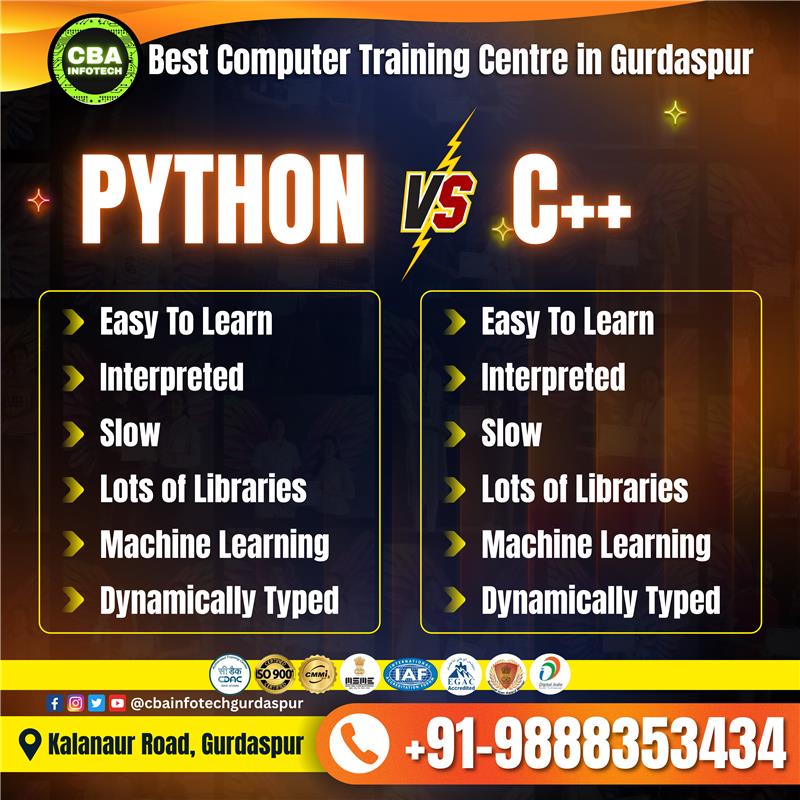
Introduction
In the ever-evolving world of software development, the choice of programming language can greatly influence the success of a project. Two of the most popular and widely used languages are Python and C++. While both have strong reputations and loyal communities, they serve different purposes and excel in distinct areas of software engineering.
At CBA Infotech, we understand that choosing the right programming language is not just about syntax—it’s about scalability, efficiency, performance, maintainability, and long-term growth. Whether you’re building enterprise-grade applications, artificial intelligence models, or real-time embedded systems, your choice between Python and C++ matters.
In this blog, we’ll explore Python vs C++ in depth—covering their features, advantages, limitations, and ideal use cases—so that you can make an informed decision for your next project.
About CBA Infotech
CBA Infotech is a leading IT solutions provider specializing in custom software development, web applications, mobile app solutions, enterprise systems, and cutting-edge technologies such as AI, ML, and IoT. Our development teams work with a wide range of programming languages and frameworks to ensure that our clients get the most efficient, scalable, and future-ready solutions.
When it comes to Python and C++, we have extensive experience in deploying them across industries like healthcare, education, fintech, manufacturing, and e-commerce, ensuring that businesses leverage the right technology for their unique needs.
What is Python?
Python is a high-level, interpreted programming language known for its simplicity, readability, and versatility. Created by Guido van Rossum in 1991, Python has grown into one of the most popular languages worldwide, powering everything from simple scripts to advanced machine learning models.
Key Features of Python:
- Readable and simple syntax: Ideal for beginners and rapid prototyping.
- Interpreted language: Executes line by line, making debugging easier.
- Huge standard library & frameworks: Django, Flask, TensorFlow, PyTorch, Pandas, NumPy, etc.
- Cross-platform: Runs on Windows, Linux, macOS, and embedded devices.
- Dynamic typing: No need to define variable types explicitly.
Advantages of Python:
- Fast development speed and shorter code.
- Excellent for data science, AI, ML, and automation.
- Strong community support with millions of developers worldwide.
- Integrates well with other languages (C, C++, Java, etc.).
Limitations of Python:
- Slower execution speed compared to compiled languages like C++.
- Higher memory consumption.
- Not ideal for system-level programming or performance-critical applications.
What is C++?
C++ is a powerful, compiled, object-oriented language developed by Bjarne Stroustrup in 1985 as an extension of the C language. It is widely used for system software, high-performance applications, gaming engines, embedded systems, and real-time simulations.
Key Features of C++:
- Compiled language: Translates code into machine-level instructions, resulting in faster execution.
- Object-Oriented Programming (OOP): Supports encapsulation, inheritance, and polymorphism.
- Low-level memory manipulation: Offers control over hardware resources.
- Standard Template Library (STL): Predefined classes and functions for data structures and algorithms.
- High portability: Runs across multiple platforms.
Advantages of C++:
- Extremely fast and efficient in execution.
- Ideal for resource-intensive applications (gaming, finance, simulations).
- Offers more control over system resources.
- Backward compatibility with C code.
Limitations of C++:
- Complex syntax, making it harder for beginners.
- Longer development time compared to Python.
- Higher risk of memory management errors.
Python vs C++: Head-to-Head Comparison
| Factor | Python | C++ |
|---|---|---|
| Execution Speed | Slower due to interpretation. | Very fast as it’s compiled. |
| Ease of Learning | Beginner-friendly with simple syntax. | Steeper learning curve, complex syntax. |
| Development Speed | Rapid prototyping and coding. | Requires more time and effort. |
| Use Cases | AI, ML, data science, web apps, automation. | Gaming, system software, embedded systems, real-time apps. |
| Memory Management | Automatic (Garbage Collection). | Manual memory management (more control). |
| Scalability | Highly scalable with frameworks. | Extremely scalable for performance-heavy apps. |
| Community Support | Huge global community. | Large, especially in system-level dev. |
| Portability | Cross-platform, easy integration. | Portable but requires recompilation. |
Use Cases & Industry Adoption
Where Python Excels:
- Artificial Intelligence & Machine Learning: Libraries like TensorFlow, PyTorch, and scikit-learn make Python the #1 choice.
- Data Science & Analytics: Pandas and NumPy simplify big data handling.
- Web Development: Frameworks like Django and Flask power scalable web apps.
- Automation & Scripting: Ideal for repetitive task automation.
- Prototyping: Rapidly test and deploy applications.
Where C++ Excels:
- Game Development: Engines like Unreal Engine are built in C++.
- System Programming: Operating systems, compilers, and drivers often rely on C++.
- High-Performance Applications: Finance (trading systems), simulations, and real-time applications.
- Embedded Systems & IoT: Low-level hardware control makes it perfect for microcontrollers.
- Desktop Applications: Heavy applications requiring speed and resource optimization.
Python or C++: Which Should You Choose?
The choice between Python vs C++ largely depends on your project goals, performance needs, and development priorities.
- Choose Python if:
- You need fast development and prototyping.
- Your focus is on AI, ML, data science, or web development.
- You want ease of learning and flexibility.
- Choose C++ if:
- Performance, speed, and hardware-level control are top priorities.
- You are building games, system software, or real-time simulations.
- You need resource-efficient and scalable applications.
At CBA Infotech, we often recommend Python for projects requiring agility, rapid growth, and data-heavy tasks. On the other hand, for high-performance computing, embedded systems, and enterprise-scale software, C++ remains unmatched.
Conclusion
Both Python and C++ are industry giants, but they serve different roles. While Python empowers developers to innovate quickly with its simplicity and rich ecosystem, C++ ensures efficiency, performance, and control for resource-heavy applications.
At CBA Infotech, our expertise spans across both languages, enabling us to deliver tailored solutions that align with your business goals. Whether you’re envisioning a machine learning platform in Python or a high-performance gaming engine in C++, our dedicated team ensures you get the best of technology with reliability, scalability, and innovation.






